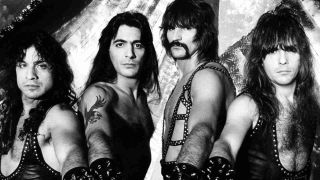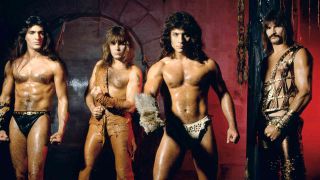Loincloths. Broad swords. Black wind. Sacred salutes. It was all part of what made Manowar arguably the most individual band on the metal scene in the early 1980s, with a style of music that called upon the wrath of the gods and the heritage of mythology in a unique metal manner.
Before battle metal picked up the cudgels, and many years prior to power metal becoming acceptable, Manowar launched their proverbial chariots and long boats against a dissenting and sceptical world. How ironic is it that, at a time when their stock and influence in the UK has never been greater, the band simply refuse to come over and tour. Even weirder when you consider that they titled their third album, 1984’s Hail To England. As bassist Joey DeMaio said at the time: “England is like our spiritual home. And this is the one country in the world that’s taken us to their hearts”.
Forged as the 1980s dawned to shed the light of loudness on a world clambering through the darkness of new wave, Manowar was the dream of bassist DeMaio and guitarist Ross The Boss. They’d met at the Newcastle City Hall when the former was a roadie with Black Sabbath, while the latter was playing with the Sabbath support band Shakin’ Street. Together with vocalist Eric Adams and drummer Donny Hamzik they created the muscle-rippling musical invasion that was 1982’s debut album Battle Hymns, received far better in Britain than in their native America. They even persuaded legendary actor/director Orson Welles to narrate on the song The Dark Avenger. “It was a meeting of like minds,” claimed DeMaio, with some justification. “In spirit, it was like he was a member of Manowar.”

But the band’s label, EMI-America, didn’t exactly view Manowar’s mentality and refusal to compromise with much enthusiasm. And so they were dropped. It didn’t take long, though, before the band were signed to the young Megaforce label, run by Marsha and Johnny Z, and already with a catalogue that included Metallica and Anthrax. Typically, the band (with Scott Columbus now wielding the sticks behind the drum kit) signed their contract with the label in their own blood – not just a gimmick to get attention, but also in their world a statement of commitment. Bonded by blood, record company and band unleashed the formidable Into Glory Ride album in 1983, which was licensed to Music For Nations in the UK. And it was here that the foursome were starting to enjoy their greatest triumphs.
There was a brief hiccough when they fell out badly with Mercyful Fate during a debut visit to the stages of Britain. But the word was spreading – Manowar were not to be messed with. Snigger at your peril, infidels. Cackle and face the consequences.
By now, I’d fallen under their spell. Phenomenal musicians, a core adoration for the magic of metal and an eloquence that defied the norm and deified the very highest values. They were on a crusade. So, at the end of 1983, I travelled to New York to hear in person their new album, and to find out what they were like on home territory.
I got to hear the album in a red sports car, careering around New York, driven by Ross The Boss’ girlfriend Judy. Together with DeMaio, the four of us were treated to the album played at a volume that might usually precede the arrival of the Mongol hordes. This was metal incarnate. As the band themselves proclaimed so vociferously in the song Gloves Of Metal, the music was “so loud it cracked the beams.”
Amazingly, at a time when careful production was the norm, Manowar had recorded the album in just 12 days at Toronto’s Phase One Studios. The cost? A mere $20,000 – not enough to satiate the thirst of a small Viking raiding party.
Back at Judy’s apartment, in the Queen’s district of NYC, we settled down for an insight into the album.
“So, Joey,” I began, “tell me about the…”
“No, no, brother,” he interrupted,“ before we do anything else, we must prepare ourselves.”
I was flummoxed. ‘Prepare ourselves’… how? The answer was a little less daunting than I feared. Out came a video of the classic movie Excalibur, and all of us then spent the next two hours enthralled in its every nuance.
Shaken and stirred into the right frame of mind, I started again.
“So, Joey, tell me about…”
“Not yet. There’s something more!” said DeMaio, with that stentorian sense of destiny. More? What more… the answer came in the form of classical music – specifically Wagner – being slipped onto the turntable. Now the scene was set. And now DeMaio was ready to talk…
“I’ll come clean with you, this is the first good album we’ve made. We’ve put a dedication on the LP sleeve which says ‘Jack Richardson is God’, and that’s the way we feel about him. He’s 54 and he treated us like sons, cooking meals for all four members of the band as well as guiding us through the recording stages.
“We actually wanted Jack to do our very first album, but couldn’t get a hold of him. We’re delighted with the way things have turned out under his guidance.”
Not that Richardson was the band’s first choice…
“It’s strange the way events take shape. Originally we were going to work with Jon Mathias again, the guy who did ‘Into Glory Ride’. He’s a friend of ours, and he told us how much he wanted to produce this new album. So, when the time came for us to begin recording, we contacted him and he said, ‘Yeah, I’m up for it, call my manager and he’ll sort out the details’. So I rang Jon’s manager and he said, ‘OK, fine, how much of an advance have you got?’ When I told him we had nothing, he literally said, ‘Jon’s not interested’, and hung up on me!
“I don’t hold anything against Jon, he’s still a good pal. But it’s obvious what’s happened: he’s got this business manager in, who’s ordered him not to do anything that doesn’t pay on the dot, however friendly he is with the guys involved. It seems everyone is getting in managers now and they just louse up your career. You soon lose all your friends and suddenly you’re alone. It happened to us with Bill Aucoin, so I understand both the temptation to get in somebody to do the financial work and also the dangers. Aucoin nearly destroyed us!”

Bill Aucoin made his name in the 1970s with Kiss. He managed Manowar in their early days, when they were signed to a major label. It didn’t work out too well on all fronts. Anyway, back to DeMaio…
“As things turned out, Jack was a fantastic choice. We worked really fast in the studio. We’re not one of those bands that likes to re-do the drum sound a million times. To us, spontaneity is what counts. And we don’t believe in wasting valuable studio time trying to work out arrangements. Most of the stuff for this album was already honed down to a fine point long before we went into Phase One.
“Doug Hill, who owns the studio, told us horrendous things about what happened when [the Canadian band] Anvil did their ‘Forged In Fire’ album there. Apparently, they spent $140,000 on studio time alone, block booking six weeks of time, ensuring they had access to the studio day and night. So, what did they do? The guys would turn up at three in the afternoon, smoke a little dope and then someone would say, ‘Hey, who fancies doing some work today?’
“To us, it’s music that counts. We believe in certain values and won’t compromise on them to any extent. Manowar are trying to create six-to-10 minute symphonies that are technically stretching and give the fans something to hold onto beyond simple riffs. I’m a great fan of Ennio Morricone [composer of the soundtracks to such movies as Fistful Of Dollars and The Good, The Bad, And The Ugly]. His style of dramatic orchestration is what I love listening to.”
Hail To England was released in February 1984, and charted in the UK, reaching number 83, the first time the band had ever made the Top 100 over here. And its bristling combination of studious musicianship, epic valour and glorious, optimistic tirades of riffage reinforced the band’s foothold on the metal community here and in Europe. But it wasn’t right for the times. It was glamour, sleaze and trash that was selling. Mötley over metal. Ratt before riffs. And the fact that Manowar went so far as to perform live in loincloths compounded the mirth. But they were serious – deadly so!
“It seems that these days image is more important than music,” railed DeMaio 22 years ago. “Look at the scene in Los Angeles. There, people are more concerned in spraying on loads of hair lacquer, putting on layers of make-up and posing in the right places than making a serious study of heavy metal. Be honest, how on earth can you call any of those bands heavy metal?

“The reason we called the album Hail to England is because we’re with the people who are with us. When Battle Hymns was released, we suddenly found ourselves dropped by the idiots at the label in America who had no idea how to market us. We were left for dead, and probably would have folded had it not been for the support we got from England.
“The press over there kept us going. We owe our existence to English heavy metal fans and this is our way of saying ‘thank-you’ to them all. If we are to break big, then the buzz will have to start from a place like England.
“Already, Manowar is regarded in many American quarters as an English band – our only way forward is through England.”
More than two decades on, Manowar of course are massive in Germany, France, Greece, Spain… it would seem everywhere in Europe but here. They’ve not played in Britain for more than a decade, and the chances of them coming back in the near future seem remote. A pity, because what they did on ‘Hail To England’ is now suddenly so appropriate and apposite. It has a bravura and honesty that rides right through the hyperbole.
But let’s end with this statement of intent from DeMaio as the band prepared for a British tour in 1984. It sums up their confidence, belief and focus:
“We’ve said so much about how good we are onstage that fans have a right to come up and expect to be impressed. All I’d say if we fail to match your expectations then you’ve every right to tell us to get out of the country and never come back.”
Death to false metal, indeed.
Originally published in Metal Hammer 147

